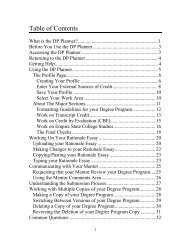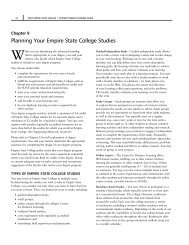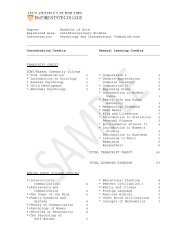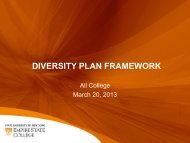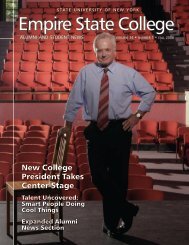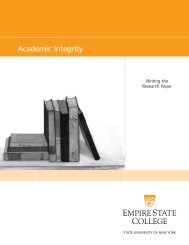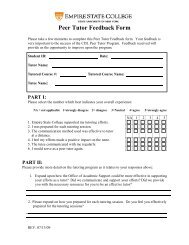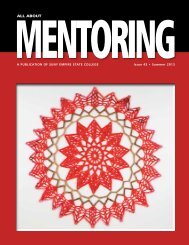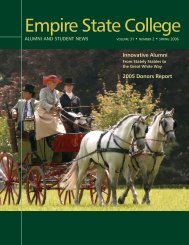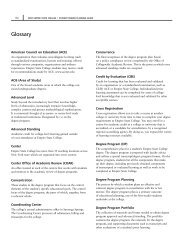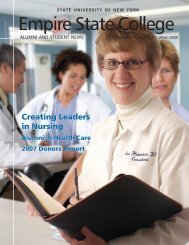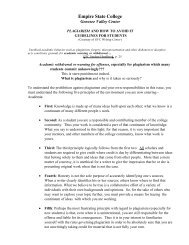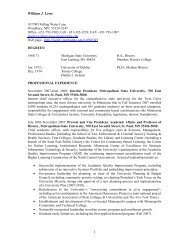All About Mentoring Spring 2011 - SUNY Empire State College
All About Mentoring Spring 2011 - SUNY Empire State College
All About Mentoring Spring 2011 - SUNY Empire State College
You also want an ePaper? Increase the reach of your titles
YUMPU automatically turns print PDFs into web optimized ePapers that Google loves.
17<br />
While I find this useful in the analysis of<br />
related risks for our adult students, in my<br />
experience the following are the types of<br />
risks we are most likely to encounter in<br />
educational uses of digital and social media:<br />
Privacy and Personal Data at Risk; Security<br />
Risks; Intellectual Property and Copyright<br />
Issues; and Ethical Considerations.<br />
Privacy and Personal Data at Risk<br />
Access to digital and social media<br />
ecosystems comes with an unfortunate<br />
trade-off, in which the student is in danger<br />
of being tracked by the very websites and<br />
tools that he or she uses in order to create<br />
this knowledge. It is not uncommon, for<br />
example, for their birth date to be required<br />
to sign-up for any given Web resource.<br />
Sometimes a student is asked to provide<br />
even more personal information. This<br />
personal data is often harvested for sale to<br />
third-party advertisers. When students are<br />
asked to share information openly on a blog,<br />
to distribute their work using various Web<br />
tools, or to create objects that may become<br />
the property of the company that created<br />
the tools used, a whole new level of digital<br />
media literacy is required. Virtual worlds<br />
such as Second Life provide the student<br />
with anonymity – they may select an avatar<br />
name of their choice, and only Linden Lab,<br />
the company running Second Life, will have<br />
access to that data. Disclosure of another<br />
avatar’s personal and private information is<br />
a grievous breach of the Second Life terms<br />
of service, and therefore a bannable offense,<br />
which is not taken lightly. Following is an<br />
excerpt from the community standards that<br />
addresses the issue of disclosure.<br />
Second Life Community Standards 3<br />
Disclosure<br />
Residents are entitled to a reasonable level<br />
of privacy with regard to their Second Life<br />
experience. Sharing personal information<br />
about your fellow residents without their<br />
consent – including gender, religion, age,<br />
marital status, race, sexual preference,<br />
alternate account names, and real-world<br />
location beyond what is provided by them<br />
in their resident profile – is not allowed.<br />
Remotely monitoring conversations in<br />
Second Life, posting conversation logs,<br />
or sharing conversation logs without the<br />
participants’ consent are all prohibited.<br />
The student selecting to participate in<br />
virtual world activities is afforded a level of<br />
privacy protection that is currently higher<br />
than when they use Facebook, for example,<br />
which has an unfortunate history of making<br />
private data public without the user’s<br />
knowledge. Facebook also has been charged<br />
with harvesting personal data for the use of<br />
advertising, particularly with their Beacon<br />
program. On Aug. 12, 2008, a class action<br />
lawsuit was launched against Facebook,<br />
which was later settled for the sum of $9.5<br />
million (Brodkin, 2009). Students should<br />
be informed of the risks they take when<br />
registering for these social media services<br />
and learn to review their privacy and<br />
security settings on a regular basis.<br />
Security Risks<br />
The use of digital, social media and Web 2.0<br />
tools puts the student at risk of exposure to<br />
a wide range of threats. These range from<br />
low-level annoyances, such as infection by<br />
a computer virus, to more serious threats<br />
such as being hacked by a malicious<br />
intruder. In addition, the student should be<br />
aware of the dangers inherent to revealing<br />
private and personal data on social media<br />
networks. This may lead to serious security<br />
breaches such as identity theft, cyber<br />
stalking, harassment, and other undesirable<br />
side effects of being a digital citizen. The<br />
best preventative measure is to educate<br />
students in calculated risk analysis and<br />
raise their awareness of the implications of<br />
privacy policies and security policies, ethical<br />
considerations and legislative issues involved<br />
in using digital and social media for<br />
knowledge sharing, acquisition and creation.<br />
Intellectual Property and<br />
Copyright Issues<br />
Digital media literacy, in my opinion, must<br />
include some education on instructional<br />
copyright and copyright law, as well as<br />
ethics. The questions of intellectual property<br />
and copyright have two sides. The first<br />
involves the use of intellectual property of<br />
others by students. Do students understand<br />
that they cannot choose content created<br />
by others without their permission, even<br />
if it seems to be readily available online<br />
In this new era, some students struggle to<br />
understand that digital artifacts belong to<br />
their creator, and unless otherwise stated,<br />
should not be appropriated, refashioned or<br />
repurposed without permission. The other<br />
side of intellectual property and copyright<br />
involves the protection of the student’s<br />
work. Many free tools have a lengthy terms<br />
of service agreement in which, buried in<br />
small print, they claim full ownership of<br />
any content and materials uploaded using<br />
their service, or, require the user to grant<br />
the service a perpetual license to use and<br />
redistribute the content, even in advertising.<br />
Students should pay careful attention to the<br />
content ownership clauses of any terms of<br />
service agreement prior to registering for<br />
a service.<br />
Ethical Considerations<br />
The convenience of digital and social media<br />
comes at an ethical cost to both users and<br />
providers. Choosing to access a digital or<br />
social media site (or application) presents<br />
the user with an ethical choice regarding<br />
how they choose to use, and share digital<br />
assets available to copy, download and<br />
disseminate. 4 Will they respect copyright,<br />
attribute original authors, and share<br />
information responsibly Will they pay<br />
for monetized digital content rather than<br />
seek out pirated versions For the provider,<br />
ethical decisions are multi-layered, and in<br />
many ways define the nature and intent of<br />
the organization offering the application<br />
and services. Will they collect user data<br />
and track user activity Will this be with<br />
or without user consent Will they sell this<br />
data to third party businesses How will<br />
they protect and store the information and<br />
assets Students should be prepared to<br />
investigate whether the company providing<br />
a digital tool or service is ethical in the<br />
handling of user data and information,<br />
asking questions such as: Does all content<br />
created by the user remain the intellectual<br />
property of the user, or a company claiming<br />
all rights to all materials created with their<br />
tools Is the provider downloading hidden<br />
applications to a user’s computer to harvest<br />
information or use for advertising Does<br />
the application leave security gaps that<br />
might provide an entry point to an intruder<br />
Ethical use of content and how providers<br />
use private personal data are two of the key<br />
components of ethics, along with security<br />
policies and practices. In addition, we need<br />
suny empire state college • all about mentoring • issue 39 • spring <strong>2011</strong>



